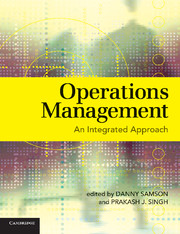Book contents
- Frontmatter
- Contents
- List of Contributors
- Preface
- Acknowledgements
- Part I Operations within Organisations – Building Blocks
- Part II Approaches to Understanding OM
- Part III Moving Forward with OM – Creating Competitive Advantage
- Part IV Challenges and Opportunities in Operations
- Part V Case Studies
- 1 Innovation in the Biotechnology Sector: The Case of IDT Australia
- 2 New Zealand King Salmon: Value-Chain Innovation
- 3 Pilila Clothing Company Goes Lean
- 4 From Singapore to the World: Port Management in Singapore
- 5 Striving for Operations Excellence within Queensland Rail Supply Division
- 6 Should I Stay or Should I Go? Shiraishi Garments Company
- 7 Towards a Green Supply Chain: Toyota Australia
- 8 Process Analyses and Improvement at Bartter Enterprises
- 9 Operations Challenges at Firth Industries Limited, Wellington Division
- 10 Ford Motor Company: Moving Forward in Australia
- 11 Technology Transfer at Hero Honda
- 12 Why Is the Patient Resident Time so Long?: The Case of St Martin's and Charity Private Hospital
- Index
9 - Operations Challenges at Firth Industries Limited, Wellington Division
Published online by Cambridge University Press: 05 June 2012
- Frontmatter
- Contents
- List of Contributors
- Preface
- Acknowledgements
- Part I Operations within Organisations – Building Blocks
- Part II Approaches to Understanding OM
- Part III Moving Forward with OM – Creating Competitive Advantage
- Part IV Challenges and Opportunities in Operations
- Part V Case Studies
- 1 Innovation in the Biotechnology Sector: The Case of IDT Australia
- 2 New Zealand King Salmon: Value-Chain Innovation
- 3 Pilila Clothing Company Goes Lean
- 4 From Singapore to the World: Port Management in Singapore
- 5 Striving for Operations Excellence within Queensland Rail Supply Division
- 6 Should I Stay or Should I Go? Shiraishi Garments Company
- 7 Towards a Green Supply Chain: Toyota Australia
- 8 Process Analyses and Improvement at Bartter Enterprises
- 9 Operations Challenges at Firth Industries Limited, Wellington Division
- 10 Ford Motor Company: Moving Forward in Australia
- 11 Technology Transfer at Hero Honda
- 12 Why Is the Patient Resident Time so Long?: The Case of St Martin's and Charity Private Hospital
- Index
Summary
The gray day in the region matched his mood as Dave Newland, Area Team Leader for the Wellington Division of Firth Industries, Limited, contemplated what to do about delivery vehicle productivity. Even the Hutt River seemed darker than usual as he mulled over the problem of simultaneously satisfying customers and satisfying headquarters. He had recently been notified by the corporate office that the trucks he used to deliver ready-mix concrete to his customers were not as productive as those used by some of the sister divisions nor were they as productive as they had been in the past. Over the past several months, construction activity had declined substantially and the demand for concrete had been shrinking. Facing this kind of market, it was very clear that responding to customer needs was critical. Although truck efficiency was important, he was concerned that focusing on efficiency might detract from customer service thereby leading to more order cancellations. Dave already had more of those than he wanted.
Company background
Firth Industries Limited, a fully-owned subsidiary of Fletcher Challenge Limited, is a major supplier of concrete and concrete products throughout New Zealand. The company traces its beginnings back to Josiah Clifton Firth who arrived in New Zealand in 1856. He decided that Auckland needed a modern flourmill, but chose to first build a brick-making factory to provide the bricks. The company's logo ‘Leading by Design’ stems from this entrepreneurial approach to problem solving.
- Type
- Chapter
- Information
- Operations ManagementAn Integrated Approach, pp. 504 - 517Publisher: Cambridge University PressPrint publication year: 2008



